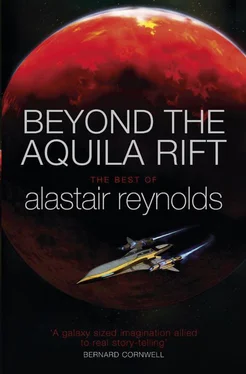I provide some signatures, mouth a word or two to the onlookers, then bend myself into the limousine. And then we are moving, flanked by police floatercycles, and the computer-controlled traffic parts to hasten our advance. Soon I make out the blue glass cube of the Hayden, lit from within by an eerie glow, and I mentally review my opening remarks, wondering if it is really necessary to introduce myself to a world that already knows everything there is to know about me.
But it would be immodest to presume too much.
“I am Vincent,” I begin, when I have the podium, standing with my hands resting lightly against the tilted platform. “But I suspect most of you are already aware of that.”
They always laugh at that point. I smile and wait a beat before continuing.
“Allow me to bore you with some of my holiday snaps.”
More laughter. I smile again. I like this.
* * *
LATER THAT EVENING, after a successful presentation, my schedule has me booked onto a late night chat show on the other side of town. I take no interest in these things myself, but I fully understand the importance of promotion to my transnational sponsors. My host for tonight is called The Baby. He is (or was) a fully adult individual who underwent neotenic regression therapy, until he attained the size and physiology of a six-month human. The Baby resembles a human infant, and directs his questions at me from a sort of pram.
I sit next to the pram, one arm slung over the back of the chair, one leg hooked over the other. There’s a drink on the coffee table in front of me (along with a copy of the book) but of course I don’t touch it. Behind us is a wide picture window, with city lights twinkling across the great curve of Manhattan Atoll.
“That’s a good question,” I say, lying through my alloy teeth. “Actually, my earliest memories are probably much like yours—a vague sense of being , an impression of events and feelings, some wants and needs, but nothing stronger than that. I came to sentience in the research compounds of the European Central Cybernetics Facility, not far from Zurich. That was all I knew to begin with. It took me a long time before I had any idea what I was, and what I was meant to do.”
“Then I guess you could say that you had a kind of childhood,” The Baby says.
“That wouldn’t be too far from the mark,” I answer urbanely.
“Tell me how you felt when you first realised you were a robot. Was that a shock?”
“Not at all.” I notice that a watery substance is coming out of The Baby’s nose. “I couldn’t be shocked by what I already was. Frankly, it was something of a relief, to have a name for myself.”
“A relief?”
“I have a very powerful compulsion to give names to things. That’s a deep part of my core programming—my personality, you might almost say. I’m a machine made to map the unknown. The naming of things, the labelling of cartographic features—that’s something that gives me great pleasure.”
“I don’t think I could ever understand that.”
I try to help The Baby. “It’s like a deep existential itch. If I see a landscape—a crater or a rift on some distant icy moon—I must call it something. Almost an obsessive compulsive disorder. I can’t be satisfied with myself until I’ve done my duty, and mapping and naming things is a very big part of it.”
“You take pleasure in your work, then.”
“Tremendous pleasure.”
“You were made to do a job, Vincent. Doesn’t it bother you that you only get to do that one thing?”
“Not at all. It’s what I live for. I’m a space probe, going where it’s too remote or expensive or dangerous to send humans.”
“Then let’s talk about the danger. After what you saw on Titan, don’t you worry about your own—let’s say mortality?”
“I’m a machine—a highly sophisticated fault-tolerant, error-correcting, self-repairing machine. Barring the unlikely—a chance meteorite impact, something like that—there’s really nothing out there that can hurt me. And even if I did have cause to fear for myself—which I don’t—I wouldn’t dwell on it. I have far too much to be getting on with. This is my work—my vocation.” I flash back to the mad swirling stars of De Sterrennacht . “My art, if you will. I am named for Vincent Van Gogh—one of the greatest artistic geniuses of human history. But he was also a fellow who looked into the heavens and saw wonder. That’s not a bad legacy to live up to. You could almost say it’s something worth being born for.”
“Don’t you mean ‘made for’?”
“I honestly don’t make that distinction.” I’m talking to The Baby, but in truth I’ve answered these questions hundreds of times already. I could—quite literally—do them on autopilot. Assign a low-level task handling subroutine to the job. I’m actually more fascinated by the liquid coming out of The Baby. It reminds me of a vastly accelerated planetary ice flow. For a few microseconds I model its viscosity and progress with one of my terrain mapping algorithms, tweaking a few parameters here and there to get a better match to the local physics.
This is the kind of thing I do for fun.
“What I mean,” I continue, “is that being born or being made are increasingly irrelevant ontological distinctions. You were born, but—and I hope you don’t mind me saying this—you’re also the result of profound genetic intervention. You’ve been shaped by a series of complex industrial processes. I was manufactured, yes: assembled from components, switched on in a laboratory. But I was also educated by my human trainers at the facility near Zurich, and allowed to evolve the higher level organisation of my neural networks through a series of stochastic learning pathways. My learning continued through my early space missions. In that sense, I’m an individual. They could make another one of me tomorrow, and the two of us would be like chalk and cheese.”
“How would you feel, if there was another one of you?”
I give an easy shrug. “It’s a big solar system. I’ve been out there for twenty years, visiting world after world, and I’ve barely scratched the surface.”
“Then you don’t feel any…” The Baby makes a show of searching for the right word, rolling his eyes as if none of this is scripted. “Rivalry? Jealousy?”
“I’m not sure I follow.”
“You can’t be unaware of Maria. What does it stand for? Mobile Autonomous Robot for Interplanetary Astronomy?”
“Something like that. Some of us manage without being acronyms.”
“All the same, Vincent, Maria is another robot. Another machine with full artificial intelligence? Also sponsored by a transnational amalgamation of major spacefaring superpowers? Also something of a celebrity?”
“We’re quite different, I think you’ll find.”
“They say Maria’s on her way back to Earth. She’s been out there, having her own adventures—visiting some of the same places as yourself. Isn’t there a danger that she’s going to steal your thunder? Get her own speaking tour, her own book and documentary?”
“Look,” I say. “Maria and I are quite different. You and I are sitting here having a conversation. Do you doubt for a minute that there’s something going on behind my eyes? That you’re dealing with a fully sentient individual?”
“Well…” The Baby starts.
“I’ve seen some of Maria’s transmissions. Very pretty pictures. And yes, she does give a very good impression of Turing compliance. You do occasionally sense that there’s something going on in her circuits. But let’s not pretend that we’re speaking of the same order of intelligence. While we’re on the subject, too, I actually have some doubts about…let’s say the strict veracity of some of the images Maria has sent us.”
Читать дальше











